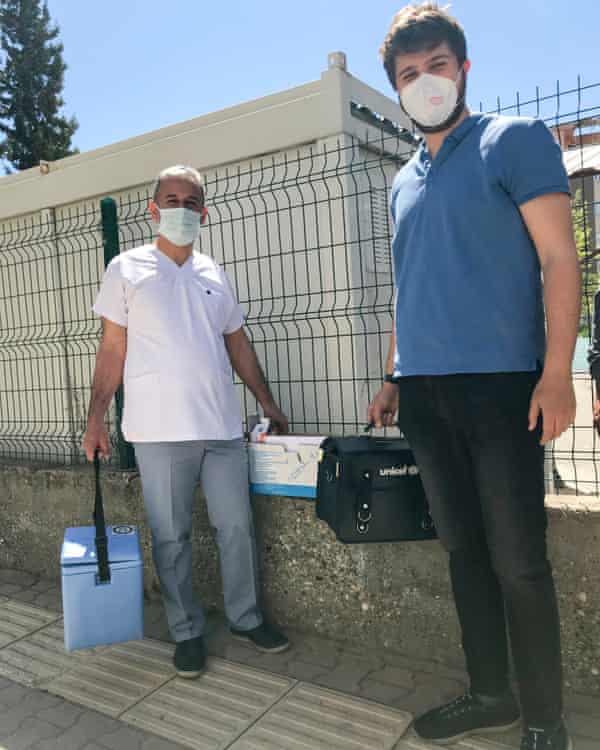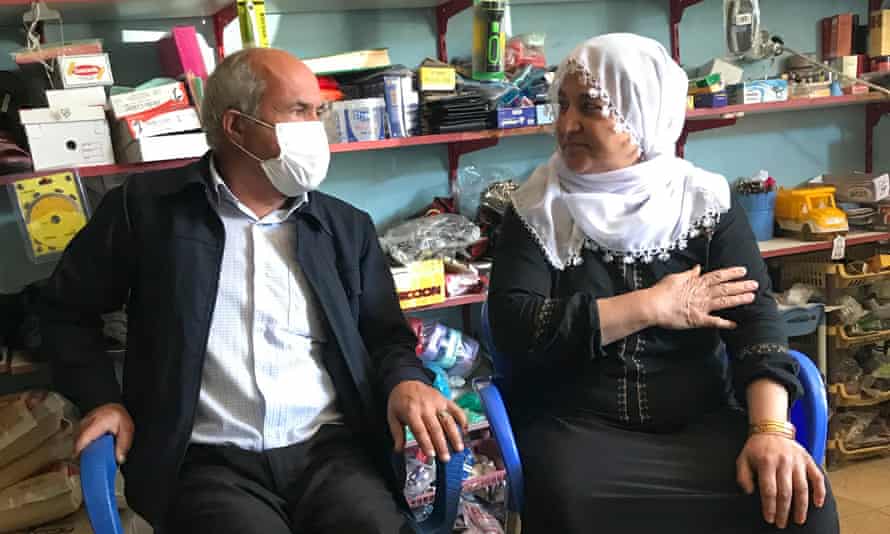A coronavirus “vaccination persuasion” initiative targeting elderly people who have declined invitations to get vaccinated is gearing up to be rolled out across Turkey after proving a resounding success in a district in the country’s south-east.
Since February, doctors and healthcare workers in the mainly Kurdish city of Adıyaman, or Semsûr, have been calling people in age groups already eligible for the vaccine to ask why they have not come to clinics for appointments.
Then, equipped with cooler boxes full of vaccine vials, and occasionally accompanied by muhtars, or community leaders, they fan out across the rural area to visit patients who are still reluctant.
The theory is that a face-to-face conversation will help change people’s minds. It is working, boosting the vaccine take-up rate among the 250,000 strong population scattered across the province’s central district by nearly 30%, according to Dr Hülya Doğan Tiryaki.
“The teams are advised to use calming language and logical arguments over the phone. About half of the people we call then tell us they will come to a clinic for their vaccination,” she said.

“Everyone else we then go visit in person, and our 35 teams manage to convince about 150 people a day. Having community leaders come with us helps a lot: they know the families we visit, and open up a channel of trust.”
While Ankara aims to have vaccinated everyone over the age of 40 against Covid-19 by the end of June, according to the latest available figures from the health ministry, vaccine scepticism in Turkey is high: 23.6% of over-65s have decided not to get inoculated, as well as 14% of healthcare workers.
During a home visit last week, 66-year-old Fatma Gultekin looked worried when her muhtar, a doctor and a health ministry worker showed up at the house.
Several calls from the family doctor had not convinced Gultekin of the merits of vaccination. But after the team reassured her that an injection would offer protection if she contracted the virus, and promised to wait with her in case of any side-effects, she rolled up her sleeve.
“Did it hurt?” 11-year-old Hira asked, hugging her grandmother afterwards. “No,” she replied.
Many people the persuasion teams encounter appear to be hesitant to get vaccinated because of fears it will affect other health problems such as diabetes, blood pressure and fertility, said Dr İbrahim Kaygusuz.
“I think sometimes people say that to cover up their fear of the unknown,” he said. “My own grandmother, who is 76, told me she was afraid of becoming barren if she got the vaccination … I told her that’s not the case, and besides, she doesn’t need another baby!”
Sometimes muhtars get creative, he said, offering vouchers or gift cards to reluctant people.
“More than one person has asked: ‘What about my other arm?’ when they realise there are incentives like that,” Kaygusuz added.
In Kuyulu, a village surrounded by fields of pistachios and lentils 27 miles (45km) away from Adıyaman city, 57-year-old Yusuf Erol said his mother had died from coronavirus, but he was worried inoculation would affect his blood pressure: his wife, Naile, 50, said she had heard it would interfere with Ramadan fasting.
After 10 minutes of talking with the persuasion team, they both decided to get vaccinated.
“They came all this way to talk to us,” Erol said. “I am thankful to them for their time.”
Adıyaman’s persuasion campaign got under way thanks to early efforts from the local health authority and governor’s office, which sought approval from the health ministry.

The health minister, Fahrettin Koca, said this month the strategy would be rolled out nationwide, although no dates have yet been given. Antalya province, on the Mediterranean, began a similar campaign last week.
Turkey implemented a third nationwide partial lockdown at the beginning of Ramadan, around the same time new cases of coronavirus shot up to record highs of more than 63,000 a day. After Monday night’s cabinet meeting, President Recep Tayyip Erdoğan announced Turkey’s first total lockdown, which will run until after the Bayram (Eid) holiday, in order “not to be left behind” as Europe prepares to reopen.
Turkey is now using the Sinovac, Pfizer and Sputnik vaccines as part of its vaccination programme and is working on a domestic product. Temperature and other storage restrictions mean that for now the persuasion teams can only carry Sinovac, which may not be as effective as other vaccines in preventing serious infection.
That did not stop Hatice Yalcin, 66, from rushing over to get her shot when the healthcare team came to visit her neighbour.
“I was sick when they called me to come for the vaccination the first time,” she said. “You will all go to heaven for this good work.”
This content first appear on the guardian
